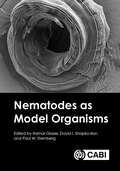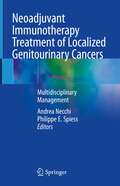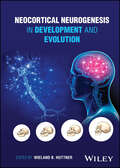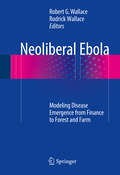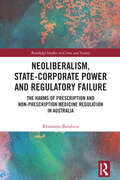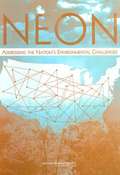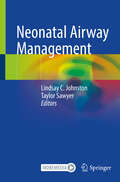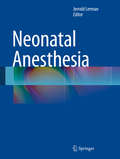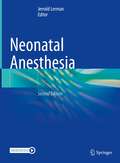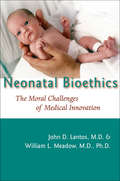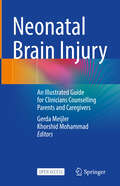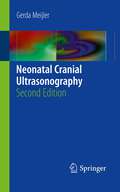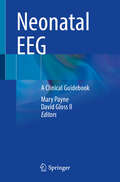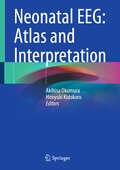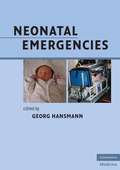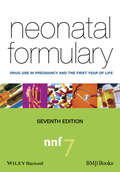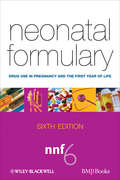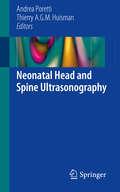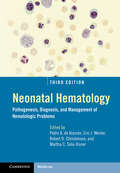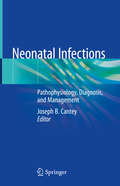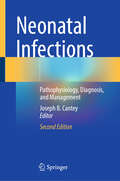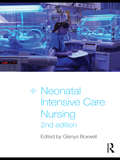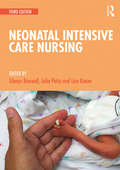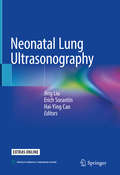- Table View
- List View
Nematodes as Model Organisms
by S. Patricia Stock Raquel Campos-Herrera Anil Kumar James Dillon Dayong Wang Ratnasri Pothula Birgit Gansfort Sebastian Höss Sigal Braun Miyara Fernando Calahorro Ioannis Eleftherianos Katarzyna Dudkiewicz Heidi Goodrich-Blair Alex S. Grossman Selcuk Hazir Jennifer K. Heppert Ivan Hiltpold Lindy Holden-Dye Emilie Lefoulon Edwin E. Lewis James W. Lightfoot Terra J. Mauer Vincent O’Connor Elizabeth M. Ransone Sara Sánchez Moreno Glen Stevens Ralf J. Sommer Ghada Tafesh-Edwards Heidi A. Tissenbaum Professor Walter Traunspurger Robert J WalkerNematodes are small multicellular organisms that have been used as biological models since the 1960s. For example, Caenorhabditis elegans is a free-living nematode worm, about 1mm in length, that lives in temperate soil environments. It is made up of about 1000 cells, and has a short life cycle of only two weeks. It was the first multicellular organism to have its whole genome sequenced. The book summarizes the importance of nematodes as model organisms in the fields of genetics, developmental biology, neurobiology, pharmacology, nutrition, ecology and parasitology. Of interest to a broad audience across a wide spectrum of disciplines, this book is useful for biologists working on comparative studies to investigate biological processes across organisms; medical scientists and pharmacologists for exploration of drugs and medicine (including the use of genome editing to eliminate diseases); ecologists considering nematodes as indicators for environment changes; and parasitologists for host-parasite interactions. Many other researchers can use this book as a benchmark for the broad implications of nematology research on other aspects of science.
Neoadjuvant Immunotherapy Treatment of Localized Genitourinary Cancers: Multidisciplinary Management
by Philippe E. Spiess Andrea NecchiThis book aims to provide readers with a current overview of enrolling trials with immune-checkpoint inhibitors in the preoperative setting of localized bladder cancer, renal cell carcinoma, and prostate cancer. The advent of immunotherapy has revolutionized treatments of genitourinary malignancy and evolved strategies for multidisciplinary management. This book explains neoadjuvant checkpoint inhibitors in localized genitourinary cancers, providing insights into the mechanisms of response and development of resistance of cancer cells to immunotherapy. It debates optimal trial design of preoperative checkpoint inhibitors in GU tumors, including optimal endpoints and the role of pathologic response as a surrogate endpoint of survival. It also illuminates clinical management of patients with organ-confined GU tumors, such as side effect management and perioperative safety, before providing an overview of biomarker use for patient selection across the early-stage GU malignancies. Lastly, the book provides the reader with the most up-to-date data emerging from clinical trials involving immunotherapy in early-stage GU malignancies. Neoadjuvant Immunotherapy Treatment of Localized Genitourinary Cancers: Multidisciplinary Management provides a comprehensive review of the field, serving as a valuable resource for urologists, medical oncologists, pathologists, fellows in urologic oncology, upper-level residents training in urology and medical oncology, as well as pharmacists interested in RCC clinicians.
Neocortical Neurogenesis in Development and Evolution
by Wieland B. HuttnerNEOCORTICAL NEUROGENESIS IN DEVELOPMENT AND EVOLUTION Understanding the development and evolution of the mammalian neocortex The development of the mammalian brain, including the human brain, is inextricably linked with its evolution. Of particular interest is the development of the neocortex, the youngest part of the cerebral cortex in evolutionary terms and the seat of such vital functions as sensory perception, generation of motor commands, and higher-order cognition. The process of neurogenesis is crucial to the formation and function of the neocortex, but this process is complex, based on species-specific adaptations of old and acquired new traits that subserve specific functions introduced during mammalian evolution. Neocortical Neurogenesis in Development and Evolution provides a groundbreaking and comprehensive overview of neurogenesis in the developing neocortex and its evolutionary implications. It covers the generation of neurons and their migration to their functional positions, neural patterning, cortical folding, and variations and malformations of cortical development. Readers will find: A comprehensive review of the evolution and development of the neocortex in mammals — the part of our brain involved in the higher cognitive functions A multitude of subject disciplines ranging from neuroscience, molecular biology, genetics, developmental biology, evolutionary biology and medicine to provide a holistic understanding of the evolutionary youngest part of the cerebral cortex Coverage of neurogenesis in the developing neocortex and how this contributes to our understanding of the evolutionary implications Neocortical Neurogenesis in Development and Evolution is essential for researchers and postgraduates in neuroscience, developmental biology, evolutionary biology, and medical research.
Neoliberal Ebola
by Robert G. Wallace Rodrick WallaceThis volume compiles five papers modeling the effects of neoliberal economics on the emergence of Ebola and its aftermath. Neoliberalism is currently the world's primary economic philosophy. It centers international relations around globalizing laissez-faire economics for multinational companies, promoting free trade, deregulating economic markets, and shifting state expenditures in favor of private property. The multidisciplinary teams represented here place both Ebola Makona, the Zaire Ebola virus variant that has infected 28,000 in West Africa, and Ebola Reston, which is currently emerging in industrial hog farms in the Philippines and China, within a multi-plank modeling framework. Using a stochastic extinction model that one group spatializes, environmental stochasticity across the ecologies in which Ebola evolves is treated as an ecosystemic prophylaxis. An agroecological logic gate is developed for epidemic control. A Black-Scholes model explicitly links economic margins across agricultural systems to success in biocontrol. This new control theory is further developed around the data-rate and rate-distortion theorems, a turbulence model, and cognitive symmetry breaking. Lastly, a model of pandemic penetrance is used to explore the domino effects of serious outbreaks amplifying through the cascades of disasters that can follow deadly pandemics. All the models presented are contextualized by socioeonomic geographies specific to outbreak locales. Together the models suggest shifts in regional agroeconomics under the neoliberal doctrine, driving deforestation and monoculture production, destroying the ecosystemic "friction" with which local forests typically disrupt Ebola transmission. The resulting collapse in such an ecological function accelerates pathogen spillover and propagation across the remaining host populations. The failure on the part of current control efforts to assimilate such a structural context may render even an efficacious vaccine dysfunctional. The authors propose an alternate science of disease and an adjunct program of interventions useful to researchers and public health officials alike.
Neoliberalism, State-Corporate Power and Regulatory Failure: The Harms of Prescription and Non-Prescription Medicine Regulation in Australia (Routledge Studies in Crime and Society)
by Rhiannon BandieraBased on over a decade of research, this book examines the social harms of Australian prescription and non-prescription medicine regulation and how these ultimately stem from neoliberalism and its reinforcement of state and corporate power.Neoliberalism shapes state and corporate power, regulation and the harms resulting from regulatory failure, yet the links between these themes are rarely discussed. Drawing on the concept of hegemonic neoliberal governmentality, this book critically examines Australian medicine regulation and the harms resulting from its failure in areas such as medicine quality, safety and efficacy; direct-to-consumer advertising; and marketing directed at health professionals. It traces these harms through the colonial foundations and evolution of medicine regulation in Australia, exploring both regulatory failure and the attempts at reforming this regulatory system. It argues that neoliberalism is not regulatable and reinforces and sustains itself, empowering the state and corporations while disempowering the public and those representing its interests. Thus, reducing its harms is only achievable through broader, transformative change, rather than by reforming (and thereby continuing to work within) the existing neoliberal capitalist system.Neoliberalism, State-Corporate Power and Regulatory Failure will be of value to practitioners, members of the public and private sector and academics active in the fields of state, corporate and state–corporate crime, social harm and regulation, as well as to those new to the study of medicine-related harms. It will also be of interest to all those concerned about their health and the medicines they use.
Neon: Addressing The Nation's Environmental Challenges
by Committee On The National Ecological Observatory NetworkThe book endorses the National Science Foundation's concept of the National Ecological Observatory Network (NEON) for providing a nationwide network of facilities and infrastructure for ecological and environmental research that is impossible with existing infrastructure. The committee identified six grand challenges in environmental biology - biodiversity, biogeochemical cycles, climate change, ecology and evolution of infectious diseases, invasive species and land and habitat use -- that deserves high priority for research and needs to be addressed on a regional or continental scale. However, the book says that NEON needs a refined focus and a more detailed plan for its implementation to ensure the maximization of its contribution to science and to better fit within the purview of Major Research Equipment and Facilities Construction funding.
Neonatal Airway Management
by Lindsay C. Johnston Taylor SawyerIntubation is one of the most performed procedures in neonatal medicine. The field of neonatal airway management has been transformed by many notable developments over the past 5-10 years. Most importantly, the use of pre-medication, video-laryngoscopy, and laryngeal masks have been the subject of numerous recent clinical investigations and academic publications. Despite ongoing research, neonatal airway management continues to carry a high risk of complications and both short and long-term morbidities. A comprehensive book on neonatal airway management has never been published. Hence, the proposed book fills an important niche in the healthcare literature. This book provides a comprehensive, state-of-the art review of neonatal airway management, and serves as a valuable resource for clinicians, educators, and researchers involved in neonatal care. The book reviews patient, practice, provider, and system factors important in neonatal airway management. Chapters explore key topic areas including airway management techniques, training, competency assessment, premedication, video laryngoscopy, laryngeal mask airway, and others.Written by experts in the field and including the most up-to-date scientific and clinical information, Neonatal Airway Management serves as a useful resource for physicians and researchers dealing with, and interested in, neonatal airway management. It provides a concise yet comprehensive summary of the current state of the field that helps guide patient management and stimulates investigative efforts.
Neonatal Anesthesia
by Jerrold LermanThis is the first comprehensive book in more than a decade in the very specialized field of neonatal anesthesia. Edited and written by a team of recognized experts in neonatal anesthesia, surgery, and intensive care, this volume is the quintessential clinical reference for perioperative care of these small patients. The considerations of developmental physiology and pharmacology, which influence anesthesia care and pain management, are clearly explained. Care for surgical and medical procedures, including sedation and monitoring in and out of the operating room, is detailed. Congenital disorders of all organ systems are described together with their current management. The special considerations for neonatal intensive care - current recommendations for fluid, nutrition, and metabolic requirements, mechanical ventilation, and management of the airway - are detailed. This topical volume concludes with a summary of complications and ethical considerations in the neonate.
Neonatal Anesthesia
by Jerrold LermanSince publication of the first edition in 2015, neonatal anesthesia and surgery have advanced at lightning speed with many new developments, hence the need to update several essential topics. These include our understanding of neonatal apoptosis, the ever-increasing use of regional anesthesia in neonates, pharmacology of drugs in neonates, the delivery of anesthesia outside the operating room, neonatal resuscitation/guidelines, and perinatal complexities such as the EXIT procedure together with the fundamental principles of developmental physiology, airway management and ventilation as well as perioperative complications and ethical considerations that are unique to this age group. This comprehensive and well-illustrated book is led by Dr. Jerrold Lerman who brings four decades of research, publication and clinical experience in pediatric and neonatal anesthesia. He has amassed a team of recognized international experts in neonatal anesthesia, surgery, and intensive care to share their knowledge in managing neonates for the challenges they face both within and without the surgical suites. Neonatal Anesthesia, the 2nd edition, is the quintessential clinical reference for perioperative care of these small patients that should be read by trainees as well as experienced clinicians and is certain to become an invaluable resource for every anesthetic and critical care department that serves children.Reviews from the 1st edition:“Lerman’s book stands alone as an up-to-date text dedicated exclusively to the practice of anesthesia in neonates … . The text covers its subject matter in extraordinary breadth and depth. … Throughout the book there are illustrative and clinically relevant diagrams, nicely supporting and summarizing relevant text for the more visual learner. … Neonatal Anesthesia is a sophisticated but approachable text that offers its readers theory-based practical approaches to understanding and managing anesthesia in our youngest, most fragile patient population.” (Stephanie A. Black and Lynne G. Maxwell, Anesthesiology, Vol. 125 (3), 2016)“It is a long-awaited contribution to the literature, filling a gap of over a decade without a neonatal anaesthesia textbook. … textbook should hold an essential and required spot on the bookshelf of any anaesthetist or critical care physician who cares for neonates. … The reference lists are comprehensive and exhaustive. Dr Lerman should be commended for finally presenting the anaesthesia community worldwide with this textbook, which will be able to stand on its own, probably for the next decade.” (K. P. Mason, British Journal of Anaesthesia, Vol. 116 (4), 2016)“This book covers in 400-plus pages and 17 chapters most of what is known about the neonatal airway, physiology, drugs and anesthetics, with separate chapters on each subcategory of neonatal anesthesia. … Certainly pediatric surgeons, anesthesiologists who only occasionally care for children, students, residents, and fellows will appreciate this book. … This is a large book on a narrow topic that has increasing relevance to the field of current pediatric practice. It is well written, well illustrated, and highly useful.” (Robert M. Arensman, Doody’s Book Reviews, April, 2015)“The book has many outstanding chapters that have been thoughtfully crafted by leading researchers in specific fields. … this book is an essential addition to any pediatric anesthesiology library in any organization that provides care to neonates. This book is an excellent resource, not only for anesthesiologists at every level of training and expertise but also for other professionals who provide postoperative care, administer sedative drugs, control the airway, and undertake procedures in newborn infants.” (Carolyne Montgomery and J. Mark Ansermino, Canadian Journal of Anesthesia, Vol. 62, 2015)
Neonatal Bioethics: The Moral Challenges of Medical Innovation (Bioethics)
by John D. Lantos William L. MeadowNeonatal intensive care has been one of the most morally controversial areas of medicine during the past thirty years. This study examines the interconnected development of four key aspects of neonatal intensive care: medical advances, ethical analysis, legal scrutiny, and econometric evaluation.The authors assert that a dramatic shift in societal attitudes toward newborns and their medical care was a stimulus for and then a result of developments in the medical care of newborns. They divide their analysis into three eras of neonatal intensive care. The first, characterized by the rapid advance of medical technology from the late 1960s to the Baby Doe case of 1982, established neonatal care as a legitimate specialty of medical care, separate from the rest of pediatrics and medicine. During this era, legal scholars and moral philosophers debated the relative importance of parental autonomy, clinical prognosis, and children's rights. The second era, beginning with the Baby Doe case (a legal battle that spurred legislation mandating that infants with debilitating birth defects be treated unless the attending physician deems efforts to prolong life "futile"), stimulated efforts to establish a consistent federal standard on neonatal care decisions and raised important moral questions concerning the meaning of "futility" and of "inhumane" treatment. In the third era, a consistent set of decision-making criteria and policies was established. These policies were the result of the synergy and harmonization of newly agreed upon ethical principles and newly discovered epidemiological characteristics of neonatal care.Tracing the field's recent history, notable advances, and considerable challenges yet to be faced, the authors present neonatal bioethics as a paradigm of complex conversation among physicians, philosophers, policy makers, judges, and legislators which has led to responsible societal oversight of a controversial medical innovation.
Neonatal Brain Injury: An Illustrated Guide for Clinicians Counselling Parents and Caregivers
by Gerda Meijler Khorshid MohammadThis Open Access book is the first to provide clinicians with practical guidelines to explain the most frequently occurring neonatal brain injuries to parents and caretakers. The brains of high-risk neonates are vulnerable to injury, and brain injuries are among the most serious complications in babies admitted to neonatal intensive care units. In addition to basic explanations about the origin, extent, severity, consequences, and treatment options of different types of brain injury, the book provides illustrations and representative brain imaging examples that enable clinicians to provide parents with necessary information, presented in a clear and concise way, using lay language and explanatory drawings. There is also a section in each chapter for parents to have for themselves. Therefore, this book is a valuable resource for practitioners from various disciplines, including neonatologists, pediatricians, neurologists, (neuro- and pediatric-) radiologists, neonatal nurse specialists, and physician assistants.
Neonatal Cranial Ultrasonography
by Gerda MeijlerCranial ultrasonography is the most important, accessible, patient friendly, and cheapestneuroimaging technique on the neonatal ward. It provides important information on brain maturation in the (preterm) neonate and enables the detection of frequently occurring brain anomalies. In this second edition of Neonatal Cranial Ultrasonography, the focus is on the basics of the technique, from patient preparation through to screening strategies and the classification of abnormalities. Many new ultrasound images have been included to reflect the improvements in image quality since the first edition. Essential information is provided about both the procedure itself and the normal ultrasound anatomy. Standard technique is described and illustrated, but emphasis is also placed on the value of supplementary acoustic windows. The compact design of the book makes it an ideal and handy reference that will guide the novice but also provide useful information for the more experienced practitioner.
Neonatal EEG: A Clinical Guidebook
by Mary Payne David Gloss IIThis comprehensive and user-friendly guidebook is for physicians and health care professionals involved in the care of neonates undergoing electroencephalogram (EEG) recordings. It aims to: Explain the technical aspect of neonatal EEG&’s Outline the maturation of the EEG Distinguish normal background from an encephalopathic background Identify seizures Identify common artifacts Provide resource of neonatal seizures Address additional neonatal neurological concerns Neonatal EEG serves as a complete and concise manual for many different types of physicians and providers, especially pediatric-based providers who are caring for neonates. It will provide more comfort with evaluation and management decisions based on the neonatal EEG.
Neonatal EEG: Atlas and Interpretation
by Akihisa Okumura Hiroyuki KidokoroThis book aims to simplify the complex interpretation of neonatal electroencephalography (EEG), focusing on key patterns essential for the prevention and treatment of brain damages. With the physiological immaturity of the central nervous system in neonates, identifying brain conditions can be challenging. However, neonatal EEG, with its excellent temporal resolution, offers a real-time window into the brain functioning, making it an invaluable bedside tool. To help readers deepen their understanding, the book provides a comprehensive collection of normal and abnormal EEGs samples, systematically categorized by postmenstrual age. Each case is accompanied by detailed observations and unique methods of interpretation, such as identifying abnormalities related to the timing of brain injuries. The book is organized into six sections: Introduction, Normal EEG patterns, Abnormal EEG patterns, Neonatal seizures, aEEG, and Practical application of neonatal EEG in clinical settings. This book is highly recommended for all neonatologists and pediatric neurologists dedicated to ensuring the intact survival and optimal neurodevelopment for high-risk newborns. It is also a valuable book for pediatricians, neurophysiologists, EEG technicians, residents, and NICU nurses, and other healthcare professionals involved in the care and follow-up of newborns discharged from the NICU.
Neonatal Emergencies
by Georg HansmannCovering the management of critically ill newborns from the first minute of life through the first 72 hours, this practical, evidence-based and clinically-informed guide will provide all members of the pediatric care team with the essential information to save lives and prevent disability. With chapters on neonatal transport, resuscitation, ventilation and ethical issues, the content is further illustrated with case studies illustrating the real-world aspects of identifying critical signs and symptoms, diagnostics and treatment in multiple settings. As well as including numerous clear diagrams and summary tables, the text includes algorithms based on international guidelines to help navigate the reader through the delivery of care, and a comprehensive listing of drugs and dosages, serving as a quick reference guide when making treatment decisions. This is essential reading for pediatric residents, fellows and junior faculty, neonatal intensive care nurses, paramedics, obstetricians, midwives, anesthesiologists and emergency medicine physicians.
Neonatal Formulary
by Sean B. AinsworthNeonatal Formulary is a unique publication that provides comprehensive guidance on the safe use of all the drugs prescribed during pregnancy and commonly given to babies during labour, delivery, and the first year of life. This new edition provides improved and detailed coverage of the many drugs that are given to women during pregnancy and during lactation where the baby's welfare must be borne in mind as well as that of the mother. Thus the whole 'pregnancy through to parenthood' journey is treated as a continuous event with information about drug use and the effects of drugs at all stages of the development from fetus to infant. Containing far more detail than is available in the British National Formulary for Children and with a companion website featuring updates related to specific drugs and dosing, Neonatal Formulary is an essential guide for neonatologists, neonatal nurses, hospital pharmacists, obstetric staff, advanced nurse practitioners and for all health care professionals caring for pregnant women and their infants in the first year of life.
Neonatal Formulary: Drug Use in Pregnancy and the First Year of Life
by Edmund HeyNow in its sixth edition, the Neonatal Formulary continues to provide advice on the safe use of drugs commonly given to babies during labor, delivery and the first month of life. In addition to the 230 monographs featured in the previous edition, 6 new drugs were added and all references have been updated. An accompanying website offers regular updates and electronic cross-links to a wide range of other useful information for neonatologists and neonatal nurses, hospital pharmacists, obstetric staff or general practitioners. For easy access, the whole text is also available for purchase in a PDA format.
Neonatal Head and Spine Ultrasonography
by Andrea Poretti Thierry A.G.M. HuismanThis book discusses the key features of normal, age-dependent neonatal head ultrasonography as well as the findings of the most common neonatal neurological disorders as visualized by this modality. Neonatal head ultrasound is an important diagnostic tool in the initial evaluation of intracranial abnormalities in newborns. Head ultrasound is a safe and cost-efficient tool for detecting brain abnormalities in preterm and term neonates, monitoring the progression of brain lesions, and describing the maturation of the developing neonatal brain. To facilitate its use at the bedside, the book is organized by clinical findings and their differential diagnoses. For each disorder, a clinical vignette describing the clinical presentation of the newborn is accompanied by high-quality ultrasound images that depict the abnormal findings and detailed explanations of these findings. This book is a succinct guide to neonatal head ultrasonography for neuroradiologists, neonatologists, and pediatricians.
Neonatal Hematology
by Robert D. Christensen Pedro A. de Alarcón Eric J. WernerWritten by practising physicians specializing in pediatric hematology, neonatology, immunology, pediatric infectious disease and transfusion medicine, this is a practical guide to the pathogenesis, recognition and management of hematologic problems in the neonate. The focus is on clinical issues encountered by pediatric specialists, and there are chapters devoted to disorders of leukocytes, platelets, procoagulant and anticoagulant proteins, and disorders of red blood cells. Neonatal transfusion, malignant disorders in the newborn, neonatal hemoglobinopathy screening, harvesting and storage of umbilical cord stem cells are also covered, and practical approaches to diagnosis and treatment given.
Neonatal Hematology: Pathogenesis, Diagnosis, and Management of Hematologic Problems (The\clinics #42-3)
by Robert D. Christensen Eric J. Werner de Alarcón, Pedro A. Sola-Visner, Martha C.Neonatal hematology is a fast-growing field, and the majority of sick neonates will develop hematological problems. This is an essential guide to the pathogenesis, diagnosis and management of hematologic problems in the neonate. Guidance is practical, including blood test interpretation, advice on transfusions and reference ranges for hematological values. Chapters have been thoroughly revised according to the latest advances in the field for this updated third edition. Topics discussed include erythrocyte disorders, platelet disorders, leukocyte disorders, immunologic disorders and hemostatic disorders. Coverage of oncological issues has been expanded to two separate chapters on leukemia and solid tumors, making information more easily accessible. Approaches to identifying the cause of anemia in a neonate are explained, with detailed algorithms provided to aid clinicians in practice. Covering an important hematologic niche with an ever increasing amount of specialized knowledge, this book is a valuable resource for hematologists, neonatologists and pediatricians.
Neonatal Infections: Pathophysiology, Diagnosis, and Management
by Joseph B. CanteyThere are approximately 4 million newborns annually in the United States, including 400,000 infants born preterm. This care occurs in nurseries of all acuity levels, sizes, and regions across the country and is provided by a variety of providers, including pediatricians, family practice doctors, nurse practitioners, and physician assistants. The most common complication during the newborn period is suspected or proven infection – either those acquired during the delivery itself or before delivery in the womb. Indeed, 4 of the 8 most commonly-prescribed medications in newborns annually are antibiotics. Therefore, these providers must all be knowledgeable about the clinical presentation, epidemiology, and approach to diagnosis, treatment and prevention of neonatal infections. However, many of these nurseries do not have convenient access to pediatric infectious disease consultation or support, and would benefit from a convenient reference guide.This book effectively and succinctly covers the pathophysiology, epidemiology, clinical presentation, approach to diagnosis and treatment, and important aspects of preventative care for the most frequently encountered neonatal and congenital infections. The first section discusses common neonatal infections (i.e., those acquired during or after delivery), including sepsis, meningitis, pneumonia, and other focal infections. The second section covers the most frequently encountered congenital infections (i.e., those acquired via the placenta while the fetus is still in-utero). Finally, the concluding section discusses the basics of infection prevention in the nursery setting, including general principles of infection prevention, how to apply those principles to families, and how to manage a suspected outbreak of infection within a nursery.This book is a unique contribution to the field. Existing texts such as the AAP Red Book fold neonatal infections in within chapters on a given pathogen, but the information is difficult to find and access quickly. By covering neonatal and congenital infections thoroughly while still keeping each section clear and concise, this Handbook will be a valuable resource for the busy nursery provider.
Neonatal Infections: Pathophysiology, Diagnosis, and Management
by Joseph B. CanteyThoroughly updated and expanded, the second edition of Neonatal Infections is intended as a quick-reference guide for the busy clinician caring for newborns and young infants, whether in the nursery, the ward, the clinic, or the intensive care unit. It covers infections acquired during birth or while in the hospital (Part 1), as well as congenital infections acquired in utero (Part 2). Summary chapters regarding infection control and prevention, outbreak management, diagnosis of infection, antibiotic stewardship, and immunizations are also included (Part 3). Neonatal Infections is a concise yet thorough and visual handbook for infectious disease specialists, neonatologists, pediatricians, family practitioners, medical students, hospitalists, nurses, and all clinicians caring for infants in the nursery or neonatal intensive care unit.
Neonatal Intensive Care Nursing
by Glenys BoxwellThoroughly revised and updated, this new edition of Neonatal Intensive Care Nursing is a comprehensive, evidence-based text for nurses and midwives caring for sick newborn babies. Written by and for nurses, it concentrates on the common problems occurring within the neonatal intensive care unit. This user-friendly text will enable nurses to recognise, rationalise and remedy these problems using both a multi-systems and an evidence-based approach. Individual chapters include: Professional Development • Developmentally-focused Nursing Care • Resuscitation of the Newborn • Management of Thermal Stability • Management of Respiratory Disorders • Cardiovascular Management • Brain Injury in the Preterm Infant • Haematological Problems • Pain Management • Fluid and Electrolyte Balance • Nutritional management • Neonatal Infection • Diagnostic and Therapeutic Procedures • Neonatal Anaesthesia • Surgical Aspects of Neonatal Intensive Care • Neonatal Transport • Family Support • Ethics and Neonatal Nursing • Medication in the Newborn • Death and Dying in the Neonatal Unit It is essential reading for experienced nurses and midwives caring for sick newborn babies within the neonatal intensive care unit, for nurses undertaking qualifications in the specialism of neonatal nursing and for pre-registration students undertaking relevant modules or placements.
Neonatal Intensive Care Nursing
by Julia Petty Glenys Boxwell Connolly Lisa KaiserThoroughly revised and updated, this new edition of Neonatal Intensive Care Nursing is a comprehensive, evidence-based text for nurses and allied health professionals caring for sick newborn infants. This user-friendly text focuses on the common problems and related care occurring within the neonatal specialty. All previous chapters have been thoroughly updated and new content includes chapters on, for example, organisation of neonatal care, assessment of the neonate, the premature and low birth weight neonate as well as palliative care. In addition, the book now includes a broad and in-depth web-based companion comprising online resources, case studies with answer guides and learning activities. This accessible and interactive approach enables nurses to recognise, rationalise and understand clinical problems using an evidence-based approach. Divided into four parts, the book provides an overview of neonatal care, and a detailed look at the physical and emotional wellbeing of neonate and family, a range of clinical aspects of neonatal care, and key practices and procedures. Neonatal Intensive Care Nursing will be essential reading for both new and experienced nurses, allied health professionals and students learning about neonatal care including those undertaking qualifications in the neonatal specialism and pre-registration students taking relevant modules or placements.
Neonatal Lung Ultrasonography
by Jing Liu Erich Sorantin Hai-Ying CaoThis book presents lung ultrasound as an accurate, reliable, low-cost and simple imaging technique, which poses no risk of radiation damage, making bedside use both feasible and convenient in neonatal wards. The aim of this book is to introduce the features of common lung diseases found in newborns that are detected using ultrasonic imaging. It introduces five important diseases, including respiratory distress syndrome (RDS), transient tachypnea of the newborn (TTN), infectious pneumonia of the newborn (IPN), pulmonary atelectasis of the newborn (PAN) and pneumothorax. In addition, the fundamental principles, commonly used terminologies and methods of performing lung ultrasound are also included in this book. The audience includes all neonatologists, pediatricians and pulmonologists.
